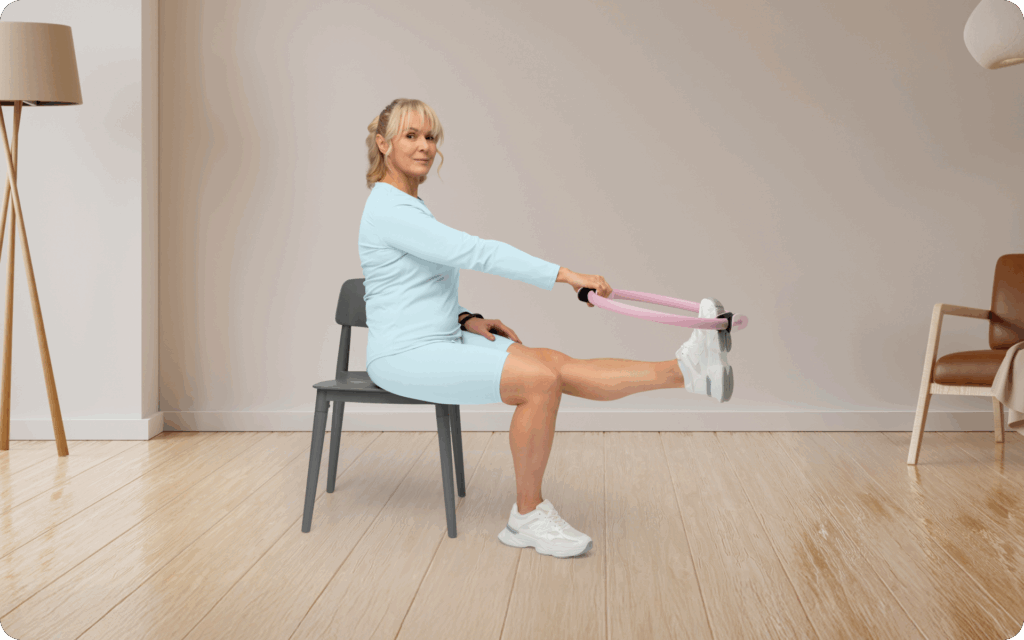Are you a senior looking to shed some extra pounds but worried about doing it safely? Losing weight as you get older can feel tricky.
Your body changes, and what worked before might not be right now. But here’s the good news: with the right steps, you can lose weight without risking your health or energy. You’ll discover simple, safe ways to reach your weight goals while feeling stronger and more vibrant every day.
Keep reading to find out how you can take control of your health—starting today.
Benefits Of Safe Weight Loss For Seniors
Safe weight loss helps seniors live healthier and happier lives. It reduces health risks and improves daily activities.
Losing weight slowly and safely supports strength and prevents injuries. It is important for seniors to focus on safe methods.
Improved Mobility And Balance
Weight loss can make moving easier for seniors. It reduces pressure on joints and muscles.
Better balance lowers the risk of falls. This helps seniors stay active and independent longer.
- Less joint pain
- Increased walking ability
- Improved stability
- Lower fall risk
Enhanced Heart Health
Safe weight loss reduces strain on the heart. It helps control blood pressure and cholesterol levels.
Healthy heart function lowers the chance of heart disease and stroke. It supports longer, better quality life.
- Lower blood pressure
- Reduced cholesterol
- Improved blood sugar control
- Stronger heart function
Better Mental Well-being
Weight loss can boost mood and self-esteem. It helps reduce feelings of anxiety and depression.
Regular exercise and healthy eating improve brain function. This supports memory and focus in seniors.
- Improved mood
- Increased confidence
- Better sleep quality
- Sharper memory
Common Weight Challenges In Seniors
Many seniors find it hard to lose weight safely. Aging changes the body in ways that affect weight.
Understanding common challenges helps seniors make better choices to manage weight.
Slower Metabolism
Metabolism slows down as people age. The body burns fewer calories even when resting.
This means seniors need fewer calories but must stay active to avoid weight gain.
Muscle Loss And Bone Density
Seniors lose muscle mass and bone strength over time. This makes it harder to stay active.
Less muscle means a slower metabolism and more fat gain if not careful.
- Muscle loss reduces strength and balance
- Lower bone density increases risk of fractures
- Exercise helps maintain muscles and bones
Medication Effects
Some medicines cause weight gain or make losing weight harder. They can change appetite or metabolism.
Seniors should talk to their doctor about how medicines affect their weight and health.
Creating A Balanced Diet Plan
Losing weight safely is important for seniors. A balanced diet helps with good health and weight control.
Eating the right foods and watching portions can make a big difference. Drinking enough water also supports weight loss.
Nutrient-rich Foods To Include
Seniors should eat foods full of vitamins and minerals. These foods support the body and keep energy levels steady.
Choose fruits, vegetables, whole grains, lean proteins, and healthy fats. These help keep you full and provide important nutrients.
- Leafy greens like spinach and kale
- Berries such as blueberries and strawberries
- Whole grains like brown rice and oats
- Lean meats such as chicken and fish
- Nuts, seeds, and healthy oils
Portion Control Strategies
Portion control helps avoid eating too many calories. Smaller plates and bowls can make portions look bigger.
Eating slowly and stopping when full helps prevent overeating. Measuring food portions can keep servings accurate.
- Use smaller dishes for meals
- Check serving sizes on food labels
- Eat slowly and chew well
- Stop eating when you feel satisfied
- Plan meals and snacks ahead
Hydration Importance
Drinking enough water is key for weight loss. Water helps digestion and controls hunger.
Seniors should drink water regularly throughout the day. Avoid sugary drinks that add empty calories.
- Drink at least 6-8 cups of water daily
- Keep a water bottle nearby
- Drink water before meals to reduce appetite
- Avoid soda and sugary juices
- Herbal teas can also help hydrate
Safe Exercise Options
Seniors need safe exercises to lose weight effectively. Choosing the right activities helps avoid injuries.
Safe exercises improve health and boost energy. They support weight loss without straining the body.
Low-impact Cardio Activities
Low-impact cardio is gentle on joints and heart. It increases heart rate without harsh movements.
Walking, swimming, and cycling are good examples. These activities help burn calories safely.
- Walking on flat surfaces
- Swimming or water aerobics
- Riding a stationary bike
- Using an elliptical machine
Strength Training Benefits
Strength training builds muscle and boosts metabolism. More muscle helps burn more calories.
Light weights or resistance bands are safe options. They improve balance and prevent falls.
- Use light dumbbells or resistance bands
- Focus on major muscle groups
- Perform 2-3 sessions per week
- Rest between workout days
Flexibility And Balance Exercises
Flexibility exercises keep joints moving well. Balance exercises reduce the risk of falling.
Stretching and yoga improve flexibility. Simple balance moves help maintain stability.
- Gentle stretching routines
- Chair yoga or floor yoga poses
- Standing on one foot
- Heel-to-toe walking
Monitoring Progress And Staying Motivated
Seniors need to watch their weight loss progress carefully. Staying motivated helps keep them on track.
Small changes and steady progress make a big difference over time. This guide explains how to do it safely.
Setting Realistic Goals
Set goals that fit your health and lifestyle. Small, clear goals work best for steady weight loss.
Goals should be easy to measure and reach. This helps avoid frustration and keeps motivation high.
- Focus on losing 1-2 pounds per week
- Include goals for daily activity and healthy meals
- Adjust goals based on how you feel and progress
Tracking Changes Safely
Keep a simple record of your weight and how your clothes fit. Use a notebook or a phone app.
Check progress once a week to avoid stress. Sudden changes can be normal, so look at long-term trends.
- Weigh yourself at the same time each week
- Note energy levels and mood changes
- Track exercise and food intake gently
Seeking Support And Accountability
Find friends, family, or groups to share your journey. Support helps keep you motivated and accountable.
Talking about your goals with others makes you more likely to keep them. Join local or online groups for seniors.
- Share your progress with a trusted person
- Join walking clubs or exercise classes
- Use reminders or apps to stay on track

Consulting Healthcare Professionals
Seniors should talk with healthcare professionals before starting a weight loss plan. This helps ensure safety and the best results.
Doctors and specialists can guide seniors on healthy ways to lose weight. They check for any health risks first.
Medical Checkups Before Starting
Getting a full medical checkup is important before losing weight. This checkup shows current health status and risks.
Doctors check heart health, blood pressure, blood sugar, and other important factors. This helps make a safe plan.
- Review current health problems
- Check for conditions that affect weight loss
- Test for vitamin or mineral deficiencies
- Assess physical ability for exercise
Adjusting Medications If Needed
Some medicines can affect weight or cause side effects during weight loss. Doctors can adjust these medicines.
It is important to follow doctor advice about medicines. Never stop or change medicines without professional guidance.
- Review all current medications
- Check if medicines affect appetite or metabolism
- Adjust doses to support healthy weight loss
- Monitor side effects closely
Working With Dietitians And Trainers
Dietitians can create meal plans that meet seniors’ nutritional needs. Trainers design safe exercise routines.
Working with these experts helps seniors lose weight safely and keep muscles strong. It also improves energy and mood.
- Dietitians focus on balanced, nutrient-rich foods
- Trainers develop exercises fitting abilities
- Both provide motivation and support
- They help track progress and adjust plans
Avoiding Common Pitfalls
Seniors want to lose weight safely to stay healthy and active. Some mistakes can slow progress or cause harm.
Knowing what to avoid helps seniors lose weight without risking their well-being.
Crash Diets And Fad Programs
Crash diets promise quick weight loss but often lack important nutrients. They can make seniors feel weak.
Fad programs may not fit seniors’ health needs. They often ignore long-term health effects.
- Crash diets can cause muscle loss, not just fat loss
- Fad diets may lead to nutrient deficiencies
- Rapid weight loss can lower energy and immunity
- Steady, balanced eating is safer and more effective
Ignoring Body Signals
Seniors must listen to their bodies when losing weight. Pain, dizziness, or fatigue are warning signs.
Ignoring these signals can cause injuries or health problems. Rest and medical advice are important.
- Stop any activity that causes pain or discomfort
- Watch for signs like shortness of breath or chest pain
- Eat when hungry and avoid skipping meals
- Consult a doctor if unusual symptoms appear
Overexertion Risks
Overdoing exercise can harm seniors. Their bodies need more time to recover than younger adults.
Too much strain can lead to muscle injury, joint pain, or heart problems.
- Start slow and increase activity gradually
- Include rest days between workouts
- Choose low-impact exercises like walking or swimming
- Stop exercising if feeling dizzy or very tired


Frequently Asked Questions
How Can Seniors Start Losing Weight Safely?
Seniors should begin with a medical consultation to assess health conditions. Gradually introduce low-impact exercises like walking or swimming. Focus on a balanced diet rich in whole grains, lean proteins, and vegetables. Monitor portion sizes and stay hydrated. Regularly track progress and adjust the plan as needed for safety and effectiveness.
What Exercises Are Best For Seniors Losing Weight?
Low-impact exercises such as walking, swimming, and cycling are ideal for seniors. These activities minimize joint stress while improving cardiovascular health. Strength training with light weights can enhance muscle mass and metabolism. Always prioritize exercises that match fitness levels and consult with a professional for personalized guidance.
Can Seniors Lose Weight With A Slow Metabolism?
Yes, seniors can lose weight even with a slow metabolism. Focus on nutrient-dense foods and smaller, frequent meals to boost metabolism. Regular physical activity, particularly strength training, can increase muscle mass and metabolic rate. Patience and consistency in lifestyle changes are key to achieving weight loss goals.
What Role Does Diet Play In Senior Weight Loss?
Diet plays a crucial role in senior weight loss. Consuming a balanced diet with fruits, vegetables, lean proteins, and whole grains aids in achieving a calorie deficit. Avoid processed foods and sugary drinks. Portion control and mindful eating help maintain a healthy weight and overall well-being.
Conclusion
Seniors can lose weight safely by making small, healthy changes. Choosing balanced meals and staying active helps the body stay strong. Drinking enough water and getting good sleep support weight loss. Always talk to a doctor before starting any new plan.
Patience matters; slow and steady progress lasts longer. Enjoy the journey to better health and feel your best every day.



